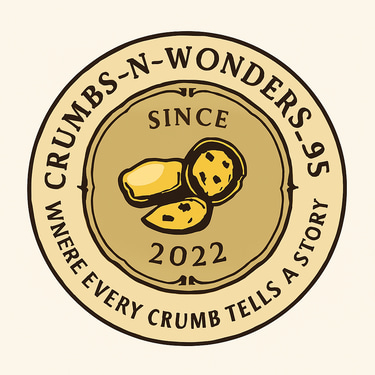"From Ashes to Apricot Tarts: Markus's Journey of Faith and Flour" Do not quench the Spirit
A seasoned aid worker finds spiritual renewal through baking, rediscovering purpose as he listens to the quiet voice of God in a new season of life.
BACK IN THE DAY
Wandering Armenian
7/22/20254 min read


From Ashes to Apricot Tarts: Markus's Journey of Faith and Flour
Do not quench the Spirit
The rejection email arrived on a Tuesday. Markus stared at the screen, his coffee growing cold as he read the familiar words: "Thank you for your interest... unfortunately... we have decided to move forward with other candidates."
It was the fourteenth rejection in four months. Each one felt like a small death.
He closed his laptop and walked to the kitchen window, watching his neighbour Mrs. Chen tend to her vegetable garden. At fifty-four, Markus had spent three decades in places most people couldn't find on a map-refugee camps in North Greece, earthquake zones in Haiti, and war-torn villages where hope arrived in supply trucks. His passport was thick with stamps from countries that had needed him, desperately. His hands bore scars from building shelters, his heart from holding too many grieving mothers.
But now those same hands felt useless, drumming against the kitchen counter in restless rhythm.
"Maybe it's time to consider something else," Sarah had said gently last week, her voice careful as she folded laundry. His wife's patience had been heroic these four years, but he caught her sometimes staring out windows with that distant look he recognized—the same one he'd seen in displaced families wondering if they'd ever find a home again.
The kitchen was quiet except for the hum of the refrigerator. Markus opened the pantry, more out of habit than hunger, and his eyes fell on a jar of apricot preserves he'd bought months ago. Without thinking, he pulled out flour, butter, eggs. His hands moved with muscle memory from another life, another kitchen—a bombed-out community centre in Croatia where he'd learned to make these tarts from an elderly woman named Marija who'd lost everything but her recipes.
"Food is love made visible," she'd said in broken English, her weathered hands guiding his. "Even when there is no love left in the world, we can still make it."
As he worked the butter into the flour, something shifted. The familiar rhythm of creation measuring, mixing, shaping felt like coming home to a part of himself he'd forgotten existed. This wasn't strategic planning or crisis management. This was simply... making something good.
The first batch of tarts emerged golden and fragrant, their apricot centres gleaming like tiny suns. Markus’s bit into one and suddenly felt he was back in that Croatian kitchen, watching Marija's face light up as displaced families tasted sweetness after months of bitterness. He'd thought then that his real work was logistics-coordinating aid, managing supply chains, drafting reports. But his real work had been those quiet moments when dignity was restored with a shared meal.
"Do not quench the Spirit," he whispered, remembering Paul's words from 1 Thessalonians 5:19. How many times had he preached that to others? How many times had he told weary aid workers that God's calling doesn't always look like what we expect?
The Spirit hadn't left him. He'd just stopped listening for it in the silence.
Over the following weeks, Markus found himself in the kitchen more often. He perfected his tart recipe, experimented with different fillings, learned to read the tricky signs of perfectly baked pastry. When Mrs. Chen mentioned her arthritis was flaring, so he brought her a box of tarts. When the new refugee family down the street looked overwhelmed at the grocery store, he appeared at their door with warm pastries and a gentle smile.
"Follow Me," Jesus had said in Matthew 16:24. Markus had always imagined that meant following a geographical path, country to country, crisis to crisis. But what if it meant following wherever love led—even if that was just across the street?
At the community centre’s monthly potluck, Markus brought four dozen tarts. As people gathered around the dessert table, he watched faces transform the same way he'd once watched faces transform when clean water arrived or when medical supplies reached a clinic. The currency was different, but the transaction was the same: hope made tangible, love made visible.
"You know," said Pastor Williams, savouring his second tart, "I've been thinking about starting a cooking ministry for folks going through job transitions. You interested?"
Markus looked around the room—at the recent retiree struggling with purpose, at the young mother whose husband had been laid off, at the teenager aging out of foster care. All of them navigating their own deserts, their own seasons of waiting.
"The one who calls you is faithful, and He will do it," he murmured, remembering Paul's promise from 1 Thessalonians 5:24. God hadn't changed His mind about Markus. He'd just changed the uniform.
Three months later, Markus stood in that same community centre kitchen, teaching a dozen people to make apricot tarts. His students included a former bank executive, a retired teacher, and a teenager who'd been cutting classes. Their hands were tentative at first, unsure of the rhythm, but gradually they found their way.
"The secret," Markus told them, watching their faces concentrate on the delicate work, "is to trust the process. Even when it doesn't look like anything special is happening, something beautiful is taking shape."
As golden tarts emerged from the oven and filled the room with their sweet fragrance, Markus caught a glimpse of something he'd almost forgotten: the quiet satisfaction of feeding people, of creating something that nourished both body and spirit. His mission hadn't ended—it had just learned to speak a different language.
Sometimes Sarah still asks if he misses the field. Markus considers the question while rolling out pastry dough, feeling the familiar weight of purpose in his hands.
"I never left the mission," he says, sliding another batch of tarts into the oven. "It just came home with me."
Reflection: What "detour" might God be using in your life to draw you closer to His voice? How might your quiet passions be the place He chooses to work next? Consider how the Spirit might be speaking not in the noise of your ambitions, but in the gentle rhythm of your daily bread—or in Markus's case, your daily tarts.

